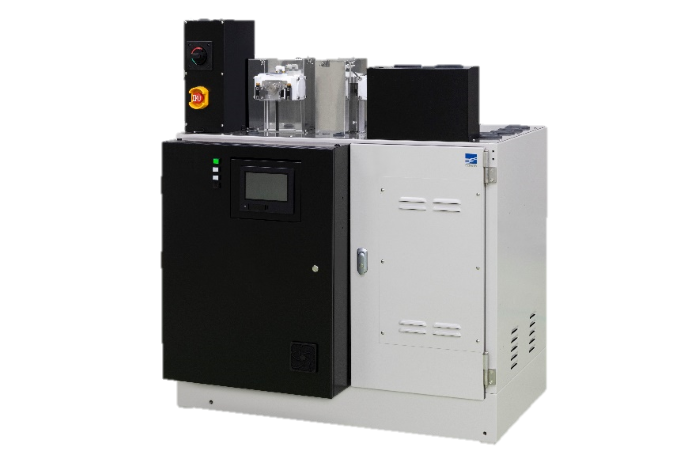Ebara Corp. Unveils Semiconductor Manufacturing Solution: Model LPCMN Exhaust Gas Abatement System
The Model LPCMN neutralizes process gases by reducing byproduct adhesion and NOx/COx emissions and offers a compact design, hydrogen fuel options, and high airflow capacity.
EBARA Corp. plans to unveil the Model LPCMN combustion-based exhaust gas abatement system, with sales beginning in January 2025. The system is designed to neutralize process gases in semiconductor manufacturing using four primary features:
- Reduction of Byproduct Adhesion and NOx/COx Emissions
- The Model LPCMN features a high destruction and removal efficiency of more than 95% with hard-to-decompose gases like CF4. It uses a dual-stage combustion burner that minimizes byproduct adhesion in the gas processing chamber, reducing NOx and COx pollutants.
- Compact Design for Low Footprint
- The system’s height is approximately 50% reduced over previous models to enable more upper-space usage in semiconductor manufacturing facilities.
- Hydrogen Fuel Option
- The Model LPCMN burns conventional fossil fuels, but now includes hydrogen fuel options for customers electing sustainable energy operation.
- Maximum Airflow Capacity
- Similar to the Model TND, the new unit features a high airflow capacity of 600L/min.
System Background & Specifications
The semiconductor manufacturing sector uses numerous specialized gases that require safe abatement and the reduction of reactive byproducts, which may interrupt continuous operation. Model LPCMN addresses these challenges by enhancing processing and durability performance over EBARA’s previous Model TND.
Model LPCMN; image credit: EBARA

Further specifications include:
- Four inlet connections, with a six-inlet model expected in 2025
- Dimensions of 1200 x 700 x 900
- Hydrogen, city gas, and propane fuel options
- Compatible with ALD, PE-CVD, LP-CVD, and etching
EBARA News
Last week, Saudi Aramco Total Refining and Petrochemical Co. (SATORP) chose Ebara Elliot Energy to deliver advanced equipment for its AMIRAL petrochemical complex in Jubail, Saudi Arabia. Per the equipment supply contract, the company will provide 22 units from its compressor, pump, and turbine product lines, which will be manufactured across the company’s international facilities. The contracts, on behalf of SATORP, were granted by Hyundai Engineering Co. and Maire Tecnimont.
The AMIRAL strategic expansion project involves the construction and integration of a 1,650-kiloton-per-annum mixed-feed cracker and petrochemical units. The cracker and associated units will be connected to the existing SATORP refinery, allowing the company to reach carbon neutrality by 2050 in alignment with sustainability and energy transition initiatives.
In September, EBARA announced that it will construct a new equipment testing and development center for hydrogen infrastructure in Futtsu City, Japan, designed to build-out a domestic and international hydrogen supply chain. The center will conduct equipment performance tests and develop elemental technologies using liquid hydrogen; this ensures that liquid hydrogen pumps can be implemented in a hydrogen society. To guarantee safe and stable liquid hydrogen pump operation and quality assurance for customers, Ebara will perform testing using liquid hydrogen at -235° C.
And in May, Ebara Elliott Energy was contracted by TTCL Public Company Ltd. to provide a motor-driven recycle compressor with a variable frequency drive for the Sustainable Fuel Development Project in Bangkok, Thailand—the country’s first SAF commercial production unit. The project uses 100% used cooking oil, operated by BSGF, and is designed to cater to domestic and international aviation industries. The SAF Production Plant has an initial daily capacity of 1,000,000 liters, which is ready for immediate use without affecting engine performance.